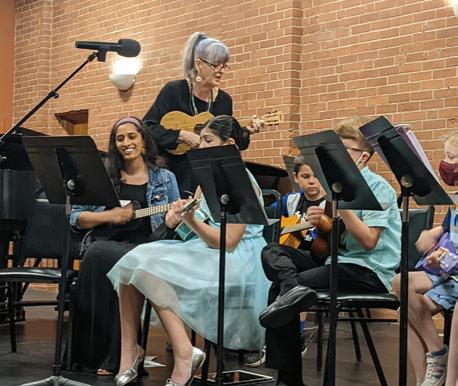
3 minute read
Empty Nest Furnishing an
from Northeast Ohio Parent | June July 2023
by Mitchell Media LLC: Northeast Ohio Parent & Northeast Ohio Thrive/Boomer
Whether your child is off to college in the fall or starting their life after graduation, parents can find joy while grieving their new role.
by Erin Sernoffsky
Commencement season has commenced, collegiate summer breaks are drawing to a close, and parents everywhere are preparing for a new reality—coming home to an empty nest.
When kids fly the coop every aspect of a parent’s life changes and the results can be bittersweet. Left with more time, less involvement, and relieved of curfew enforcement, parents now have more flexibility to devote themselves to new hobbies, goals, and adventures. But they can also find themselves experiencing very real feelings of grief.
This is an all-too familiar reality for David and Jennifer Zimmerman of Copley as their sons Jacob and Tyler progress through medical school and Kent State University. The Zimmerman family has been proactive, however, working together to establish new lines of communication and allowing their boys the space they need to grow, along with the reassurance they will be there for them along the way.
“As a close-knit family, the hardest part was not having eyes on them every day,”
David Zimmerman says. “You can catch up on the phone or Facetime, but you still only know what they share with you. This new void is definitely a change for you and your spouse and it causes you to really look at your lives through a different lens.”
This experience is common, according to Beverly Majors, LPCC-S of Soul’s Journey Counseling in Medina. A specialist in issues of grief, loss, and trauma, Majors understands the profound impact this change can have.
“For some, their identity has been tied to their role as a parent, so they then grieve the loss of this role,” Majors says. “Others may have anxiety about their children’s physical, mental and emotional safety when they are on their own and making their own decisions. Others may be grieving for what they did not get to experience with their children.”
To ease this transition, Majors recommends working intentionally to establish what a new parent-child relationship will be early on. Parents can learn to offer support, while also letting their children make their own decisions, and oftentimes, their own mistakes.
“A pitfall to avoid is the temptation to make your child’s decisions for them, in an effort to help them avoid life’s difficulties and to maintain one’s parental role,” Majors says. “It is important to remember that there is a lot to be learned about oneself through making mistakes. This is an opportunity for children to learn valuable life lessons and gain a better understanding of themselves.”
Children need this time to establish who they are outside of their family circle, similar to how parents are finding their identity apart from full-time caregivers. It’s a balancing act to be sure, but throughout this period parents know they still have a major role to play, and their adult kids can grow in independence while still calling home for help and guidance when they need it.
“It was important to take their lead on the most appropriate frequency of communication,” David Zimmerman recalls. Early in their sons’ college careers the Zimmermans took advantage of sporting events, parents weekends, and other reasons to visit; still giving their sons space, but keeping that close family structure intact. “Often, you would assume that they don’t want to be bothered, but that may not be the case. At some point, they realize this arrangement is more permanent than summer camp and they start to need some guidance and touch points that they wouldn’t have predicted themselves.”
The empty nester phase isn’t all about grief and new boundaries, it’s a great opportunity for parents to reignite old friendships that have may have been pushed to the back burner, shift their career focus, and even begin to get to know spouses and partners in a new way, apart from co-parenting.
“If parents choose to, they can explore who they are at this stage of their lives — and redefine themselves outside of the role of parent,” Majors says. “They are no longer in the young adult stage of figuring out and building a career, or in the middle adult stage of raising a family. They can explore things they have been interested in that they previously may not have the time or money to explore.
This exploration goes hand-in-hand with what adult children are experiencing, and can become an additional bond between parents and children.
It’s important for parents to accept that joy and grief coexist as children move out from under their roof. While letting go of the constant involvement in their kids’ lives can be incredibly difficult, doing so makes room for a deeper relationship, as well as new adventures.
“All in all, it has only increased the appreciation we all have for each other,” David Zimmerman says. “They truly appreciate us being there to pick up the pieces and we are glad they continue to ask our advice as they realize they don’t actually know everything.”










